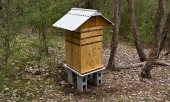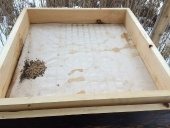








Living in Anjou , France,
For the many not for the few
http://www.permies.com/t/80/31583/projects/Permie-Pennies-France#330873








How permies.com works
What is a Mother Tree ?




 they know what they are doing .
they know what they are doing .
Living in Anjou , France,
For the many not for the few
http://www.permies.com/t/80/31583/projects/Permie-Pennies-France#330873




 1
1




Living in Anjou , France,
For the many not for the few
http://www.permies.com/t/80/31583/projects/Permie-Pennies-France#330873




"People may doubt what you say, but they will believe what you do."




Moderator, Treatment Free Beekeepers group on Facebook.
https://www.facebook.com/groups/treatmentfreebeekeepers/









Michael Cox wrote:Actually the thermosolar hive has the same fundamental issues as chemical treatments. When we artificially cull the varroa population - regardless of if it is chemical, mechanical, or in this case thermal - we disrupt the balance in the hive. This supports populations of bees with weak genetics and selects for mites which reproduce rapidly to expand their numbers again.
As with all other treatments for varroa, it benefits the individual hive in the short term, but at the expense of allowing natural selection to work effectively on the species as a whole.
It is much better to let nature take its course and breed from the bees that survive varroa, rather than prop up weak colonies. Many people are using these techniques successfully, and there is a very active facebook group of treatment free beekeepers.
https://www.facebook.com/groups/treatmentfreebeekeepers/
"People may doubt what you say, but they will believe what you do."




Todd Parr wrote:
Michael Cox wrote:Actually the thermosolar hive has the same fundamental issues as chemical treatments. When we artificially cull the varroa population - regardless of if it is chemical, mechanical, or in this case thermal - we disrupt the balance in the hive. This supports populations of bees with weak genetics and selects for mites which reproduce rapidly to expand their numbers again.
As with all other treatments for varroa, it benefits the individual hive in the short term, but at the expense of allowing natural selection to work effectively on the species as a whole.
It is much better to let nature take its course and breed from the bees that survive varroa, rather than prop up weak colonies. Many people are using these techniques successfully, and there is a very active facebook group of treatment free beekeepers.
https://www.facebook.com/groups/treatmentfreebeekeepers/
While that is somewhat true, at least this type hive doesn't contribute to the problem of creating ever more chemical resistant mites. It also doesn't select for mites that "reproduce rapidly to expand their numbers" if it can actually kill 100% of the mites.
I personally don't treat my bees, but I also think there is the possibility that rather than evolving to the point of being able to overcome the mites, bees could just lose the battle with them. Nature doesn't care if the bees win, or the mites do. I know two bee keepers that live very near me. One treats, and he lost 2 hives of 800 this year. The other is a small beekeeper with 30 years experience who switched to treatment free this year. He lost all 12 of his hives to mites. Obviously, I'm hoping to establish bees that can survive without treatment, and without feeding. I handle my hives accordingly. One of my hives made it through their first winter and seems to be doing well so far this year. At the same time, I realize that "It is much better to let nature take its course..." is only true if we don't lose the honeybees while trying to do so.
Moderator, Treatment Free Beekeepers group on Facebook.
https://www.facebook.com/groups/treatmentfreebeekeepers/









Michael Cox wrote:It can't kill 100% of the mites. For a start some of the population of a hive are outside the colony on foragers or on drones at any one point. Even if it did manage to kill every mite within the structure of the hive, the colony would be immediately reinfected by mites drifting from other colonies. SO what selection pressure does this put on mites? Surely mites that spend more time outside of their host hive become selected for (to avoid the heat treatment, and to increase the chances of reinfecting a hive that is treated). The mites that drift into a newly cleansed colony then breed explosively... this is where the seletion for rapid breeding comes in.
And finally, why do you believe that varroa will wipe out bees? Historically this is not what has happened with other parasitic species that have made the jump to honey bees. Tracheal mites wiped out bee populations from about 1905 to 1925 in the UK - known at the time as Isle of Wight Disease. There were no treatments for Isle of Wight disease and by some estimates 95% of colonies were lost. The colonies that survived showed resistance to the mites and were bred from, such that now tracheal mites are an innocuous parasite cohabiting with bees that causes no problems.
Why hasn't varroa reached a similar equilibrium, given it has had more time to do so than it took for Isle of Wight disease to be beaten? Quite simply it is because we treated to save individual hives, rather than to selectively breed for bees with resistances.
In countries where treatments for varroa never became popular - for instance poor african nations - their bees suffered for a few years but varroa is now a non-issue for them. Some developed countries are now starting to catch up, but faced with an overwhelmingly large population of treated bees the progress is slow.
"People may doubt what you say, but they will believe what you do."




Michael Cox wrote:It is much better to let nature [natural selection] take its course and breed from the bees that survive varroa, rather than prop up weak colonies.









Argue for your limitations and they are yours forever.
 3
3




Mike Barkley wrote:I drew up some plans for a solar heated beehive. Not for varroa mites but to keep them warm in winter. I have the electronic & mechanical skills to control temps accurately & automatically. It would be a fun project but when I thought about it more decided it was a bad idea. A very bad idea. Sooner or later every man made thing WILL fail. In this particular case all the bees would probably die. Not the result I strive for.
Moderator, Treatment Free Beekeepers group on Facebook.
https://www.facebook.com/groups/treatmentfreebeekeepers/









If it WORKS your bees will die.
Argue for your limitations and they are yours forever.




A human being should be able to change a diaper, plan an invasion, butcher a hog, conn a ship, design a building, write a sonnet, balance accounts, build a wall, set a bone, comfort the dying, take orders, give orders, cooperate, act alone, solve equations, analyze a new problem, pitch manure, program a computer, cook a tasty meal, fight efficiently, die gallantly. Specialization is for insects.
-Robert A. Heinlein
 1
1




Sometimes the answer is nothing





wayne fajkus wrote:
There should be a point where its warm enough to survive, but still cold enough where they dont say "IT'S SPRING, LET'S GO OUTSIDE!
Im thinking something like an envelope house. Where the air hitting the hive is maybe 30 degrees instead of -20. Its still winter to them, but the winter can be managed by their normal methods to keep warm.
Worthy experiment if you're in an area that hives are killed from extreme cold.
Moderator, Treatment Free Beekeepers group on Facebook.
https://www.facebook.com/groups/treatmentfreebeekeepers/









Where the air hitting the hive is maybe 30 degrees instead of -20. Its still winter to them, but the winter can be managed by their normal methods to keep warm.
I have an idea: let's try not spraying poisons in the climate-controlled homes of these very sensitive insects. While we're at it, maybe we can stop spraying toxic and addictive substances all over their food sources. And maybe it would be a good idea to make sure there's something planted for them to eat when they're shipped off to almond deserts and other monocrops with a dearth of bee forage.
Argue for your limitations and they are yours forever.








Jeff Wesolowski wrote:I'm in my fifth or six year of beekeeping and have never treated. A beehive in it's natural state has a debris floor to the best of my knowledge. I don't think it's natural not to have one cause one of the ways bees control mites is to groom them off and where would they fall? A debris pile of course. And what type of floors do most standard hives have? Solid bottom board, does this make sense? Doesn't to me and that's why I use freeman trays, I.E., screen bottom boards with oil tray. This method and natural selection has worked for me, now I just need to raise queens from my best hives.
A build too cool to miss:Mike's GreenhouseA great example:Joseph's Garden
All the soil info you'll ever need:
Redhawk's excellent soil-building series









A human being should be able to change a diaper, plan an invasion, butcher a hog, conn a ship, design a building, write a sonnet, balance accounts, build a wall, set a bone, comfort the dying, take orders, give orders, cooperate, act alone, solve equations, analyze a new problem, pitch manure, program a computer, cook a tasty meal, fight efficiently, die gallantly. Specialization is for insects.
-Robert A. Heinlein




Chris Kott wrote:What if, instead of wood chips, you had a diatomaceous earth dust bath for any mites or beetles to be kicked out? There would be no question of their deaths. And if it was a space large enough to admit a chicken or two, that would be a chicken buffet with a built-in dustbath.
-CK
A build too cool to miss:Mike's GreenhouseA great example:Joseph's Garden
All the soil info you'll ever need:
Redhawk's excellent soil-building series









Argue for your limitations and they are yours forever.

|
"I know this defies the law of gravity... but I never studied law." -B. Bunny Defiant tiny ad:
Learn Permaculture through a little hard work
https://wheaton-labs.com/bootcamp
|



